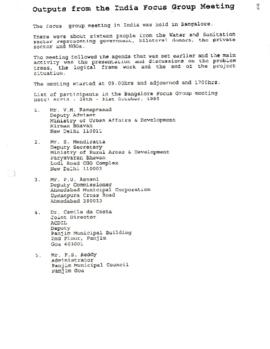Identity area
Reference code
Title
Date(s)
- 1973 - 2008 (Creation)
Level of description
Fonds
Extent and medium
139.39 linear feet of textual records; approx. 80 photographic prints; approx. 2,500 slides; approx. 275 magnetic cards; 28 flexible disks; and 40 cassette tapes
Context area
Name of creator
Biographical history
Sector departments were created as part of a World Bank-wide reorganization in 1972. The sector departments were responsible for improving and maintaining the quality of Bank lending and related operations through sector policy and guideline development; support and review of operations; recruitment assistance; staff development and training; and liaison with external organizations. Sector departments were generally not responsible for leading project lending operations and member country relations, although some sector departments, including the water sector, were involved in the administration of global program projects. The Bank's projects and member country relations were instead the responsibility of regional vice presidencies (RVPs). See the Related Units of Description for more information.
The World Bank's (Bank) projects and studies on water resource development, control, and use began in the Economic Department (which existed between April 19, 1948 and September 1952) and the Technical Operations Department (TOD) (which existed between September 1952 and January 18, 1965). These departments had similar operational and sector work responsibilities, providing expertise and assistance for projects and studies. Departments were structured geographically; there were no specific units assigned to different sectors.
The Bank's first development credit for water was in 1961: first to the Republic of China on September 6, 1961 and second to Jordan on December 22, 1961. The development credit to the Republic of China, funded by the International Development Association (IDA), financed part of the cost of the Taipei Regional Water Supply Project (P003659), i.e., the expansion and improvement of water supply facilities in the city of Taipei and surrounding suburban communities. The development credit to Jordan was IDA's first operation in Jordan; the purpose of the Amman Water Supply Project (P005239) was to assist in financing the cost of expanding and improving the water supply system in Amman.
1965 - 1971
Functional responsibility for water-related activities was first articulated in the Bank's organizational structure on January 18, 1965 with the reorganization of TOD into the new Projects Department (PRJ). The Projects Department was responsible for the identification, appraisal, and supervision of projects, as well as policy formulation,research, and advice in support of the operational activities of the area departments. The Projects Department initially had five subordinate divisions: Agriculture Division (PRJAG); Education Division (PRJED); Transportation Division (PRJTP); Public Utilities Division (PRJPU); and Industry Division (PRJIN). Water supply staff was briefly located in the Industry Division, but after the Industry Division's transfer to the International Finance Corporation on April 19, 1965, a new and separate division was created in the Projects Department called the Water Supply Division (PRJWS). Soon after, on January 1, 1967, the Water Supply Division was merged into the Public Utilities Division of the Projects Department (PRJPU).
On November 1, 1968, PRJ was terminated, and the subordinate divisions were upgraded to the department level. One of these departments was the Public Utilities Projects Department (PBP), led by Director Mervyn L. Weiner from 1969 to 1972, which maintained responsibility for the water sector from the last division. PBP continued to carry out the full range of activities related to the water sector, specifically:
-
providing advice, conducting research, and monitoring developments in sector issues;
-
carrying out sector studies to identify projects and determine priorities within sectors;
-
preparing policy papers outlining the basic principles and approaches of the Bank relating to project and sector work;
-
preparing guidelines and standards;
-
appraising proposed projects and supervising projects in execution;
-
assisting in the identification and preparation of projects;
-
providing operational support in the negotiation and administration of loans and credits; and
-
cooperating with other international agencies on programs of common interest.
PBP comprised the following divisions: Power Division I (PBPP1); Power Division II (PBPP2); Power Division III (PBPP3); Water Supply Division I (PBPW1); and the Telecommunications Division (PBPTE). In addition, in or around January 1970, another Water Supply Division II (PBPW2) was established in the department.
In October 1971, the World Health Organization (WHO) and the Bank signed an agreement to formalize the cooperation for pre-investment activities in the fields of water supply, waste disposal, and storm drainage: IBRD (International Bank for Reconstruction and Development)/WHO Cooperative Program in Water and Wastes (Cooperative Program). This stemmed from more than six years of informal collaborative arrangements, which began in late 1964. The types of work under the Cooperative Program included:
-
sector studies and sector reconnaissance;
-
project identification;
-
project preparation;
-
UNDP project formulation;
-
participation in Bank economic, project appraisal, and project supervision missions (in support of IBRD staff);
-
sub-sectoral studies on water supplies, sewerage, drainage, sanitation, and pollution control;
-
studies and technical assistance for all aspects of water and waste management and operations; and
-
project revision.
1972 - 1986
In the October 1972 reorganization, most PBP staff were dispersed to regional projects departments in newly established regional vice presidencies to fuse country knowledge and sector skills more effectively. This left PBP with a core staff of advisors responsible for operational and development policy, research, operational support, and project and sector work quality control. Led by Director Yves Rovani, PBP was contained within the Central Projects Staff Vice Presidency (CPSVP; also created in 1972) and was composed of the following divisions: Power Division I (PBPP1); Power Division II (PBPP2); Power Division III (PBPP3); Water Supply Division I (PBPW1); and the Telecommunications Division (PBPTE).
The primary responsibility of the Public Utilities Department's Central Projects staff was to improve and maintain the quality of Bank lending and related operations through formulating policies, methodology and guidelines; providing operational support and advice; and through related programs of recruitment assistance, staff development and education. They were also responsible for: reviewing operational documents and providing guidance and advice to regional offices; developing systems to monitor the project cycle; developing analytical tools such as appraisal and forecasting models; and liaising with relevant external organizations. In addition, their role was to advise, guide, cross-fertilize among regions, train, evaluate, and provide intellectual leadership. Additionally, in the case of the decentralized sectors (Public Utilities, Education, Transportation, and non-African Development Finance Companies), specialized personnel assigned to Central Projects staff were temporarily assigned to the regions to work under the full operational control and direction of the appropriate regional division chief and mission leader for the duration of the assignment.
On April 1, 1976, the Public Utilities Projects Department was renamed Energy, Water, and Telecommunications Department (EWT) to clarify its functional responsibilities. No structural changes accompanied the renaming of the department. Also, around this period, specifically between 1975 and 1977, PBP (later EWT) collaborated with the Urban Poverty Task Group for the Urban Poverty Program. The Task Group was established after President McNamara's address to the Board of Governors in July 1975, and it was charged with implementing the Bank Group's Urban Poverty Action Program to address the issues of poverty and insufficient resources, such as public water supply and sewerage services, in urban environments. PBP, then called EWT, created statements or papers designed to complement the Task Group's preliminary report to President McNamara.
In 1978, the United Nations Development Programme (UNDP) and World Bank created a formal partnership to establish the UNDP-World Bank Water and Sanitation Program (UNDP-World Bank WSP). The UNDP-World Bank WSP launched the Global Project (GLO/78/066) to examine their research findings onwater from previous years, transform it into projects, and develop and test cost-effective technologies and models for providing safe water and sanitation to low-income economies. Because of the project's success, GLO/78/066 expanded in 1982 and was renumbered and renamed Development and Implementation of Low-Cost Sanitation Investment Projects (INT/81/047). In addition, the UNDP-World Bank WSP grew to include other initiatives. This included the International Training Network (ITN) for Water and Waste Management, developed in response to and in support of the United Nation's International Drinking Water Supply and Sanitation Decade (IDWSSD) that ran from 1981 to 1990. IDWSSD focused on field-based learning to support international partners.
The core budget for the UNDP-World Bank WSP was supplied primarily by UNDP, while secondary financial support came from the Bank, government agencies, and multilateral organizations. The Bank was the executing agency. Projects and administrative activities (e.g., personnel recruitment) were managed through various iterations of the water sector departments in the Bank, such as the Water Supply and Urban Development Department (WUD) and the Technology Advisory Group (TAG). By the end of the 1990s, the UNDP-World Bank WSP had split its activities between field projects in regions across the world and evaluation of efforts to address the issue of small-scale successes that were often difficult to replicate on a national scale. In 2000, the program shortened its name to theWater and Sanitation Program (WSP), and in 2001 it adopted a charter that established a Water and Sanitation Program Council (WSPC).
On July 1, 1979, EWT was terminated after the energy functions were upgraded to an independent Energy Department (EGY). The water supply and telecommunications functions were transferred to the Transportation Department (TRP) to form the new Transportation, Water and Telecommunications Department (TWT).
The telecommunications function of the Transportation, Water, and Telecommunications Department (TWT) was moved to the newly established Industry Department (IND) in March 1982, after which the department included only Transportation and Water (TWD). Subsequently, on July 1, 1983, the independent Urban Projects Department (URB) merged with the Water Sector to form the Water Supply and Urban Development Department (WUD). Part of this reorganization involved the removal of the transportation function from the previous Transportation and Water Department and the re-creation of an independent Transportation Department (TRP). WUD continued as a sector department responsible for operations and development policy formulation, research, operational support, and quality control for project and sector work.
1987 - 1996
On July 1, 1987, a Bank-wide reorganization resulted in the termination of almost all organizational units. A new department, the Infrastructure and Urban Development Department (INU, later INF), absorbed the previous Water Supply and Urban Development Department (WUD) and Transportation Department (TRP) and was placed in the Sector Policy and Research Vice Presidency (PRE, then PRS). The PRE had no responsibility for managing operational activities but focused on operational support, formulating Bank-wide sector policies, and overseeing the ex-post evaluation of Bank-wide sector work and lending. The units within PRE concentrated on policy creation and analysis, support for operations, and sectoral research for emerging priority areas of the Bank.
The Infrastructure and Urban Development Department was responsible for:
-
developing, in consultation with the Regions, priorities for research and policy on key issues in water, sanitation, and waste management;
-
conducting policy analyses, research, external liaison, operational support, and related quality enhancement activities on various economic, technical, environmental, institutional, and management issues;
-
advising on water, sanitation, and waste management issues in the design of country strategies andstructural adjustment and sector operations;
-
providing operational support to strengthen links among research, policy, and projects;
-
reviewing the annual performance of Bank operations in the water, sanitation, and waste management sector;
-
disseminating research results and policy studies for the sector and organizing and conducting appropriate training seminars on emerging issues in the sector; and
-
managing the joint UNDP/World Bank Water and Sanitation Program, including reporting responsibility to UNDP and other donors.
On December 1, 1991, President Lewis Preston's first reorganization abolished all Senior Vice Presidencies. The new Sector and Operations Policy Vice Presidency (OSP) was created and adopted functions previously supervised by Senior Vice Presidents, including the Infrastructure and Urban Development Department, which continued to maintain responsibility for water sector functions. On January 1, 1993, as part of a larger initiative to align the Bank's organization with the priority areas of its poverty reduction effort, OSP was terminated. All research activities were removed from the departments in the Central Vice Presidencies, including INF, and were consolidated under the Chief Economist and Vice President for Development Economics (DECVP). The Policy Research Department (PRD) under DECVP became the principal research arm of the Bank. OSP was replaced by three new thematic vice presidencies: Human Resources Development and Operations Policy (HRO), Finance and Private SectorDevelopment (FPD), and Environmentally Sustainable Development (ESD).
The water function was placed in the newly created Transportation, Water, and Urban Development Department (TWU). The department was organized within the Environmentally Sustainable Development (ESD) Vice Presidency alongside three other sector or thematic departments: the Agriculture and Natural Resources Department (AGR), Environment Department (ENV), and the Consultative Group for International Agricultural Research (CGIAR) Secretariat. At the time of the creation of the Transportation, Water and Urban Development Department, it had the following divisions: the Transportation Division (TWUTD), the Urban Development Division (TWURDS), the Water and Sanitation Division (TWUWS), and the UNDP/World Bank Water and Sanitation Program (TWUWU).
Each Sector Department was responsible for the following:
-
prepare policies, guidelines, standards, handbooks, and analytical tools relevant to the sector;
-
identify, codify, and disseminate best practices and lessons of experience, and evaluate weaknesses;
-
provide advice to the Regions as needed;
-
monitor and track work in the sectors assigned to identify generic issues and identify, evaluate, and influence trends and patterns;
-
perform surveys of experience and practice within the Bank and elsewhere, and develop innovative approaches;
-
participate in Bank-wide efforts to assess skill requirements and to upgrade skills through recruitment, training, orientation, seminars, newsletters,etc.;
-
represent the Bank to external communities of interest; and
-
maintain an awareness of relevant external practices and viewpoints.
1997 - 2000
Four years later, in 1997, the thematic Vice Presidencies were reorganized to strike a better balance between country focus and sectoral excellence. In addition, to facilitate sharing expertise and knowledge, the Bank established networks that linked Bank-wide communities of staff working in the same field across organizational boundaries and with external partners. The networks formed a virtual overlay on the existing Bank organization and were intended to link staff working in the same sectors throughout the Bank, whether the staff was in the Regions, in the Central Vice Presidencies' Sector Departments, or in other Vice Presidencies.
Each of the three thematic Central Vice Presidencies was transformed into each network's central units or anchors and consisted of the existing sector departments. On a Bank-wide basis, sector specialists were grouped into regional sector units or central sector departments that worked with country departments in a matrix relationship. Staff from the central sector departments could become part of the regional operational teams when their sectoral expertise was required.
Each Network Anchor had a Network Council to oversee the entire network and sector boards covering the individual sectors within a network. The Network Council was composed of the top network managers from each Region and was responsible for settingthe network's overall agenda and promoting the effective deployment of skills across network units. Sector boards brought together the sector leaders from each Region and the central vice presidencies.
The work programs of network staff focused on:
-
global knowledge - putting the best development knowledge in the hands of Bank task teams; ensuring that the knowledge base was accessible to external clients; and contributing to the growth of the knowledge base;
-
enhanced skills - developing and providing content to training courses; establishing professional and technical standards for professional development;
-
shared strategies - assisting regional and central units to develop a common sector agenda and ensuring that skills are effectively deployed across the entire network. Network leadership assumed responsibility for global programs, sector strategy development and evaluation, strategic partnerships, and learning and dissemination;
-
best teams and best practices - improving the Bank's flexibility and mobility by building stronger task teams and delivering higher quality products; and
-
institutional initiatives - providing substantial support for new Bank-wide initiatives, such as Social Development, Rural Development, Financial Sector, Anti-corruption, Human Resources, and Knowledge Partnerships.
The result of the 1997 restructuring was four networks: the Environmentally and Socially Sustainable Development Network (ESSD); the Finance, Private Sector Development, and Infrastructure Network(FPSI); the Human Development Network (HDN); and the Poverty Reduction and Economic Management Network (PRM). The Transportation, Water, and Urban Development Department (TWU) retained its name and component parts and was situated within FPSI. In 1999, FPSI became the Private Sector Development and Infrastructure (PSI) Network. TWU remained in the newly named network.
2001 -2013
By April 2000, the water function was situated under the Infrastructure and Urban Development Department (INF) led by Director Frannie Leautier, still reporting to PSIVP. INF comprised the following units, each led by a manager: Energy (INFEG), Transport (INFTD), Urban (INFUD), and Water and Sanitation (INFWS).
INF was soon dissolved following another reorganization effective July 1, 2001 that created the Energy and Water Department (EWD), led by Director Jamil Saghir, and the Transport and Urban Development Department (TUD). EWD contained the following units: Energy Unit (EWDEN), ESMAP (EWDES), Water and Sanitation Unit (EWDWS), Water Supply and Sanitation Program (EWDWP), and four Water and Sanitation Program units based on regions. This department remained intact through the network's renaming and reorganization in 2003, when it became the Infrastructure Network (INF).
In June 2006, President Wolfowitz announced the consolidation of the former ESSD and INF Vice Presidencies into the Sustainable Development Network (SDN) to mainstream environmental issues, improve synergies, better integrate core operations, and strengthen the focus on sustainability. SDN was operational on January 1, 2007. The aim of the network integration concerning the water sector was to treat water issues more broadly by building water resource management strategies that cover agriculture, rural, and urban dimensions while linking these with energy and environmental concerns.
At this time, energy and water functions were combined with the transport sector to form the Energy, Transport and Water Department (ETW). This department was moved to the Sustainable Development Network (SDN).
In 2009, the Water Partnership Program (WPP) was launched. It was one of the Global Programs and Partnerships (GPPs) in SDN; specifically, WPP was a partnership between the World Bank and the governments of the Netherlands, Denmark, and the United Kingdom. It was a multi-donor trust fund that aimed to support water resource management and water supply in all World Bank regions and water sub-sectors.
On September 17, 2010, the restructuring of SDN separated the energy function from transport and water, and the following SDN departments were created: Environment Department (ENV); Agricultural and Rural Development Department (ARD); Concessional and Sub-National Finance (CSF); Finance, Economics and Urban Development (FEU); Sustainable Energy (SEG); Social Development (SDV); and Transport, Water, and Information and Communication Technologies (TWI).
2014
On July 1, 2014, a Bank-wide reorganization introduced by President Jim Yong Kim restructured the Bank into fourteen Global Practices (GPs) and five Cross-Cutting Solution Areas (CCSAs). Sector staff from the regional vice presidencies were relocated to the GPs or CCSAs. The GPs were responsible for each major thematic area, which the Bank supports through projects and functions as a vertical pillar of technical expertise. To achieve the United Nation's Sustainable Development Goals in the water sector (i.e., SDG 6: Ensure availability and sustainable management of water and sanitation for all), the responsibilities of the World Bank Water Global Practice (Water GP) include:
-
defining the strategic direction and the Bank's work in the water sector to support countries in ensuring safely managed sanitation services, water security, sustainable and healthy ecosystems, and economic growth;
-
developing and deploying expertise globally;
-
delivering integrated solutions to client countries; and
-
capturing and leveraging knowledge in the water sector.
Jennifer J. Sara was appointed global director of the WaterGlobal Practice in 2014. The following units in the Water Global Practice were formed after the 2014 reorganization: Water Department - Global Practice (GWADR); Water East Africa Region (GWA01); Water East Asia & Pacific Region (GWA02); Water Europe and Central Asia (GWA03); Water Latin America & Caribbean (GWA04); Water Middle East & North Africa Region (GWA05); Water South Asia Region (GWA06); Water West Africa Region (GWA07); Water Europe & Central Asia Region 2 (GWA09); Water Global Programs (GWAGP); Water Global Solutions (GWAGS); and Water Global Partnership Program (GWAWP).
Past water sector directors are as follows:
1972 - 1979: Yves Rovani (director, Public Utilities Projects Department-PBP; director, Energy, Water & Telecommunications Department-EWT)
1979 - 1983: Christopher R. Willoughby (director, Transportation, Water, and Telecommunications Department-TWT; director, Transportation and Water Department-TWD)
1983 - 1986: Anthony A. Churchill (director, Water Supply and Urban Development Department-WUD)
1986 - 1987: Ping-Cheung Loh (director, Water Supply and Urban Development-WUD)
1987 - 1995: Louis Y. Pouliquen (director, Infrastructure & Urban Development Department-INU; then Transportation, Water & Urban Development Department-TWU)
1995 - 1999: Anthony Pellegrini (director and chair, Sector Board, Transportation, Water & Urban Development Department-TWU)
2000 - 2001: Frannie Leautier (director, Infrastructure and Urban Development Department-INF)
2000 - 2010: Jamal Saghir (director, Infrastructure and Urban Development Department - Water and Sanitation-INFWS ; then Energy and Water Department-EWD; then Energy, Transport and Water Department-ETW)
2014 - 2022 : Jennifer J. Sara (global director, Water Global Practice)
2022 - present: Saroj Kumar Jha (global director, Water Global Practice)
Repository
Archival history
Before transferring records to the World Bank Group Archives (Archives) in the 1990s, responsible units forwarded sector records to be maintained in the World Bank's Central Files recordkeeping system. The centralized files were organized according to a Bank-wide classification system, and sector and operational files were traditionally divided into general files (or non-regional files); and operational files (country-specific or regional files). In 1972, Regional Information Service Centers (RISCs) for the new Regional Vice Presidencies were established under the general control of the Bank's Central Files Unit. Sector departments supporting the Regions were required to forward the country and regional operational project records to the appropriate RISC once the project was signed. At the same time, general files generated by sector departments on all topics not specific to a region or country were to be forwarded to the Non-Regional Information Center (NRIC, 1978 - 1987). Following the closure of the semi-centralized Non-Regional Information Centers (NRICs) in July 1987, the centralized records were kept at the Bank's Records Center until they were accessioned into the custody of the Archives in 1994 during the Records and Archives Management Improvement Project (RAMIP).
Most of the records in this fonds were transferred to the Archives through RAMIP in the 1990s; however, some were directly transferred to the Archives from the unit office between the 2000s and 2010s.
Immediate source of acquisition or transfer
Content and structure area
Scope and content
This fonds contains records created between 1973 and 2008 that reflect the various iterations of the water sector in the World Bank (Bank) and their activities. In particular, it includes records relating to the Bank's partnership with the United Nations Development Programme (UNDP) for the UNDP-World Bank Water and Sanitation Program (UNDP-World Bank WSP), a cooperative program created in 1978. It also contains records about the Bank's and UNDP's contributions during the United Nation's 1981 - 1990 International Drinking Water Supply and Sanitation Decade (IDWSSD).
Records in this fonds document the research, operational support, governance, quality control, and trust fund management for global program projects managed and/or supported by various Bank water sector departments. Topics include but are not limited to handpump development and testing, sewerage, landfill design, sanitation, solid waste private options, demonstration projects, and participatory development and management--initiatives involving users, particularly women (i.e., PROWWESS-Promotion of the Role of Women in Water and Environmental Sanitation Services) , and communities in all stages of the water development process.
Materials in this fonds include but are not limited to internal and external correspondence (including letters, memoranda, and telexes), project files (including reports, Country Monitoring Evaluations-CMEs, agreements, Terms of References-TORs, progress reports, budgets, personnel management files, country information, research materials, and liaison records with external agencies), training material, research files, conference and workshop materials, departmental publications, and finance and accounting records.
Appraisal, destruction and scheduling
Accruals
Accruals are expected.
System of arrangement
Work Bank sector departments forwarded their records to the Bank's centralized filing unit, which was arranged into the Bank-wide classification system. Certain "series" of records maintained in the semi-centralized NRIC, related to the water sector, were arranged in this functional department fonds when there was a clear distinction.
The original order of the records has been maintained.
Conditions of access and use area
Conditions governing access
Records are subject to the World Bank Policy on Access to Information.
Conditions governing reproduction
Records are subject to the Copyright Policy of the World Bank Group.
Language of material
- English
- French
- Portuguese
- Spanish
Script of material
Language and script notes
Physical characteristics and technical requirements
Finding aids
Allied materials area
Existence and location of originals
Existence and location of copies
Related units of description
Notes area
Note
-
See the publication by Maggie Black for information about the UNDP and World Bank partnership in water sector initiatives: Learning What Works: A 20 Year Retrospective View on International Water and Sanitation Cooperation.
-
See this sector working paper for information about urban communities and water supply and the World Bank's first lending for water and sewerage: Water supply and sewerage.
-
See this working paper for information about the United Nation's 1981 - 1990 International Drinking Water Supply and Sanitation Decade: Water and sanitation: toward equitable and sustainable development (English)
Alternative identifier(s)
Access points
Subject access points
Place access points
Name access points
Genre access points
Description control area
Description identifier
Institution identifier
Rules and/or conventions used
Internal World Bank Group Archives rules based on ISAD(G).
Disclosure status
Level of detail
Dates of creation revision deletion
31 August 2022



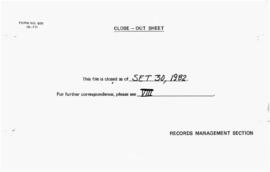
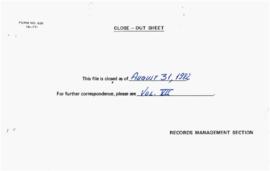
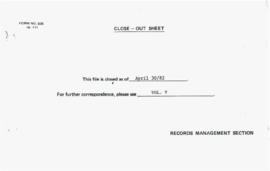
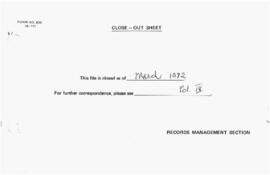


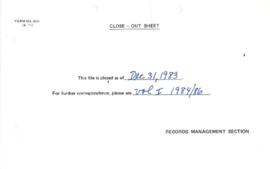




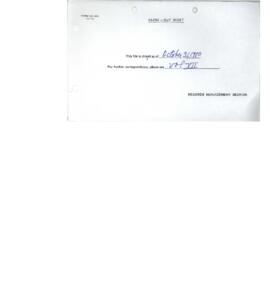

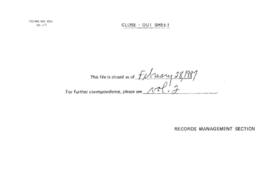

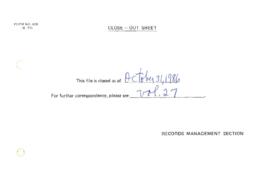


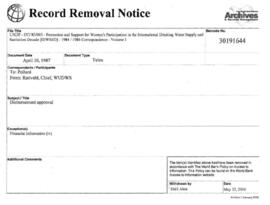





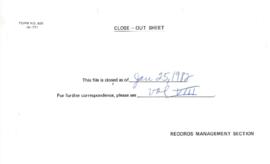




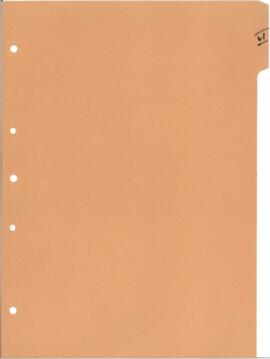
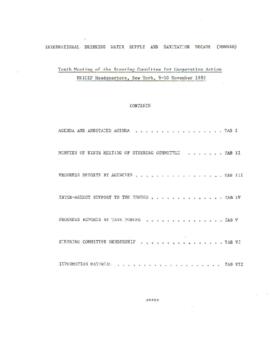

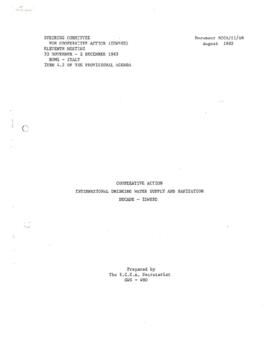
![United Nations Development Program [UNDP] Project RAS/81/001 - Memos / Letters - 1982 / 1984](/uploads/r/world-bank-group-archives/6/f/9/6f9521a3ebbdf29a55284ce115fe65f99b6610a7f23807b3563aabae71879231/WorldBankGroupArchivesFolder30146425_142.jpg)

![United Nations Development Program [UNDP] Project RAS/82/004 - Memos / Letters - 1982 / 1984](/uploads/r/world-bank-group-archives/0/f/8/0f8366c3a3239f9a093e08d5e54aba01ee6db95a831d970b188c34e90544a18a/WorldBankGroupArchivesFolder30146433_142.jpg)
![United Nations Development Program [UNDP] Project RAS/81/001 - Project Documents - 1982 / 1985](/uploads/r/world-bank-group-archives/9/4/6/94659f93bc9123ea5c35045a26117abbc4d21cf05d649a3dfda2a2d74530a3f6/WorldBankGroupArchivesFolder30146428_142.jpg)
![United Nations Development Program [UNDP] Project RAS/81/001 - Budget - 1982 / 1985](/uploads/r/world-bank-group-archives/d/d/2/dd2b86b1cd137f622615b1f0e25873c389bff409ca8f872e754e812d34390cab/WorldBankGroupArchivesFolder30146430_142.jpg)
![United Nations Development Program [UNDP] Project RAS/81/001 - Memos / Letters - 1984 / 1985](/uploads/r/world-bank-group-archives/2/d/b/2dbd2740d67efc98ad2ae0e7af930a4ce3f26abfb82666232e3cc212d0de4024/WorldBankGroupArchivesFolder30146426_142.jpg)
![United Nations Development Program [UNDP] Project RAS/82/004 - Project Documents - 1981 / 1986](/uploads/r/world-bank-group-archives/6/7/0/670602693f134ff10d0233334374a80597cfeca1e9e5b8186cbae6ba59f9639d/WorldBankGroupArchivesFolder30146435_142.jpg)
![United Nations Development Program [UNDP] Project RAS/82/004 - Memos / Letters - 1984 / 1986](/uploads/r/world-bank-group-archives/7/9/2/792d9fb49db70a15384c7d8f85c830a089fb640a0139b818c8943bc9c11ff8c5/WorldBankGroupArchivesFolder30146434_142.jpg)
![United Nations Development Program [UNDP] Project RAS/82/004 - Administration - 1982 / 1986](/uploads/r/world-bank-group-archives/c/c/e/ccef80dee799d25a5457958b7e9b95e92a8589f566e6fc8a3b3dffb0e0dd6529/WorldBankGroupArchivesFolder30146437_142.jpg)

![Water Decade United Nations Development Programme [UNDP] - Projects under Implementation - INUIS ...](/uploads/r/world-bank-group-archives/a/8/1/a81a4c699b0e34729bed69b8434ddeb0bb559766584077cb7fd13342afef8fe8/WorldBankGroupArchivesFolder1173045_142.jpg)

![Regional Water and Sanitation Group [RWSG] - South Asia [SA] - Water and Sanitation - Corresponde...](/uploads/r/world-bank-group-archives/9/c/3/9c3c545e34011e4f1689676149b194b968ce2820bb6113405aafc6aaa95b36ea/WorldBankGroupArchivesfolder1812016_142.jpg)
![Water and Sanitation Program [WSP] - Australia Aid [AusAID] - Water Supply and Sanitation Sector ...](/uploads/r/world-bank-group-archives/e/d/f/edf68139a491d1e70c7e5fc8af221f2348cb8453383833d1b98e015dfca489c7/WorldBankGroupArchivesfolder30223187_142.jpg)

